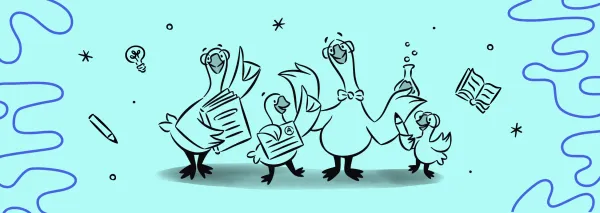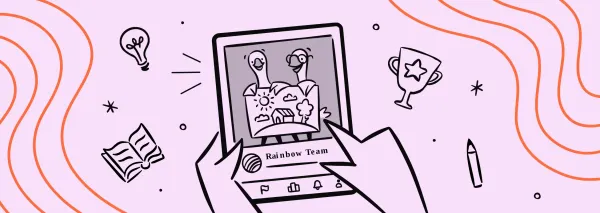Goosechase EDU: Educational Games and Apps for Students – Pricing & Get Started
Are your high school students ready to become full-fledged geese yet? They are perilously close to leaving the nest, going off to college, and joining the workforce.
…and yet, they can sometimes seem just like silly little geese-full of fun and mischief. As a high school educator, how can you keep them focused so they meet their college and life goals? One of the best ways is through educational games and interactive experiences using the Goosechase app.

Learning can be fun and engaging
“Research shows that using games in teaching can help increase student participation, foster social and emotional learning, and motivate students to take risks.”
Edutopia, The George Lucas Educational Foundation
One shock (shock!) to many college freshmen is that the professors don't actually tell them where to look for the answers (imagine that, if you can). They become so accustomed to the typical high school classroom that they haven't actually learned how to learn independently.
Many high school students are used to the traditional lecture-homework-test paradigm. Games, like those created through Goosechase EDU, provide a hands-on, collaborative way for students to explore, learn independently, and practice problem-solving.
Bridging the Gap Between High School and College
Whether using a single Goosechase Experience or expanding access with an Educator Plus plan, these interactive activities prepare students for college and real-world challenges.
Benefits include:
- Build subject knowledge with students who struggle in lecture-based classes.
- Improve attitudes about learning and increase academic scores.
- Encourage curiosity, focus, grit, and determination.
- Enhance retention by making students active participants through Missions, submissions, and GPS check-ins.
In a surprising number of high school classrooms (not yours, of course), students are still expected to learn through the traditional lecture, homework, test paradigm. While this may work for some students, others are left lost, unchallenged or bored.
Top Educational Games for High School Classrooms
Games, in contrast, bring an entirely new dimension to the traditional lesson plan and can actually help prepare students for college. They learn to overcome challenges, diversify their thinking, and seek answers independently or in collaboration with their peers.
Many college learning experiences are heavily research-driven, but how can students rise to the challenge if they've just been given the questions throughout their high school career? Games can actually help them learn problem-solving skills, how to ask the right questions, and then provide them with perseverance as they search for answers

Parents may be concerned that their children seem to be spending too much time on games. But, when used properly, games like Minecraft and Werewolf can actually help link educational content with friendly competition. Instead of isolating themselves in basements or bedrooms, students can actively use games to participate in collaborative, engaging learning experiences.
During the pandemic, when there were weeks on end of virtual learning, Goosechase Missions and other mobile-based educational games provided a much-needed outlet to keep students connected and motivated.
Other benefits that can be achieved by building lesson content around games include:
- Impactful games, including Goosechase Experiences, help build subject knowledge for students who have difficulty focusing during lecture-based formats.
- Fun, interactive games can improve attitudes about learning and increase academic scores.
- Games promote curiosity, improve focus, and help students build grit and determination as they complete Missions, submit photos or videos, and solve challenges.
- Retention of subject matter is improved. Instead of just listening and taking notes, students become active learners using mobile devices, digital tools, and Goosechase templates. Content is more likely to stick because they are using multiple skill sets to achieve the result.

How can I make my high school class fun?
In the classic movie, To Sir, With Love, the teacher played so forcefully by Sidney Poitier managed to make learning fun and meaningful for even the most challenging of high school classrooms. He brought real-world experience to students who seemed destined to go down the wrong path in life, and taught skills they would need to become adults. Here are some tips you can use to make teaching your high school class just as fun and rewarding:
- Add a little mystery for a fun field trip (we all like to guess whodunit and why!).
- Mix it up - teach lessons in different ways, to appeal to all your students. Present class material Jeopardy-style: give them a concept and work backwards, asking them to come up with questions relevant to the topic.

- Use educational games to enhance student learning (again, Jeopardy is a great example of this! Five more fun ideas just a few scrolls ahead).
- Start giving your soon-to-be adults more choices about how they will learn. For example, give them two different books to choose to write a report on.
- Incorporate technology - they love it, and so can you.
- Give them opportunities to embrace their child-like qualities every so often with silliness and creativity - adulting will be hard enough.
- Get them involved - create interactive lessons where students participate, act out scenes, or explore on their own.
- Get real - relate the subject matter to skills they will need in college, at work, or in life.
- Think outside the academic box - maybe turn it upside down, or stand on it, or have students make a new kind of box!
5 Educator Games For High School Classrooms
Here are some games that can help high school students become more engaged in their education and build a range of practical life skills:
- Geoguessr: Make geography lessons more than memorizing countries and capitals. Guide students as they use Google Maps to explore locations, see landscapes, and learn about the people and their environment. This interactive activity supports geographic education, builds map skills, and encourages students to engage with digital tools.
- Words with Friends: This Scrabble-type game was all the rage a minute ago (now Wordle in all its iterations is hot), but it still packs a powerful language punch for high school students. Two players compete in a friendly, educational game to polish vocabulary, language skills, and claim bragging rights. Offer this as an extra credit activity outside the classroom or as part of a lesson plan.
- Goosechase: Use Goosechase to build a custom game or access our library for some pretty fantastic teacher-created Experience templates, Students become active participants as they submit text, photos/videos, and complete GPS check-ins for questions you design based on your unit plan or lesson plan.
Some of the high school Experiences you can find in the library include interactive, mobile-based educational games that encourage collaboration, active learning, and engagement in the classroom.
Educator Basic vs. Educator Plus: Subscription & Pricing Options for K-12 Educators
Goosechase EDU offers two plans for individual K-12 educators. Educator Basic is free, supporting up to 3 teams per Experience - perfect for small classrooms or trials. Educator Plus is a paid plan with unlimited Missions, multiple Experiences, co-managing options, and educator tools, ideal for larger classes or school-wide use. Both plans make it easy to bring interactive, gamified learning into the classroom. Learn more about pricing options here.
Absolutism!
Students travel around the Eastern Hemisphere and meet some absolute monarchs.
Best for: Students
Grade Level: 9-12
Subject: History
Geometry Hunt
Get them exploring and learning math skills with lines, planes, and rays (no automobiles).
Best for: Students
Grade Level: 9-10
Subject: Math
4. Giant Jenga: Want to take a break from screen time? Great for any subject. Buy a giant Jenga set (or have one built in tech class) and simply put questions on each block (use chalk so you can reuse your Jenga blocks). Students pull out a block and answer the questions, while trying to keep the tower from tumbling.

5. CELLS alive! Use interactive models, puzzles and games to teach high school science.
Educational games can be a serious support to help high school students gain knowledge and achieve success with skill-building and college preparation concepts. Check out our top picks above, and explore all the ways Goosechase can help you as a high school teacher find ways to make learning fun and engaging - for you and them!
What is Goosechase?
At Goosechase, experience is everything. Originally inspired by scavenger hunts, Goosechase is an online platform that enables organizations and schools to engage, activate, and educate their communities through delightful interactive experiences. Sign up and try creating a free recreational game, or contact us to learn more about our enterprise solutions!
FAQs
How Does Goosechase EDU Work?
Goosechase EDU lets educators run interactive scavenger hunts using the app, with Missions, points, and real-time tracking. It gamifies learning to make classroom activities fun and engaging.
Is there a free version of Goosechase?
Yes, the free Educator Basic plan supports up to 3 teams per Experience, ideal for small classrooms or trial use. Paid subscriptions unlock unlimited Missions and multiple Experiences.
How to use Goosechase in the classroom?
Teachers create games and Missions in the app, have students join via teams or solo, and track progress while fostering collaboration and interactive learning.





